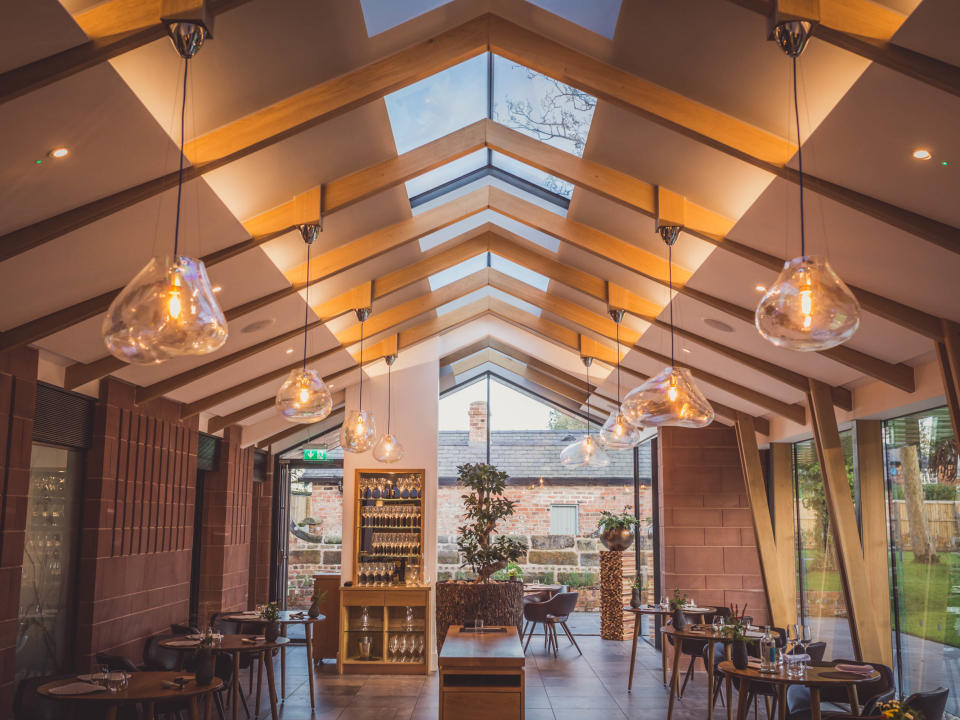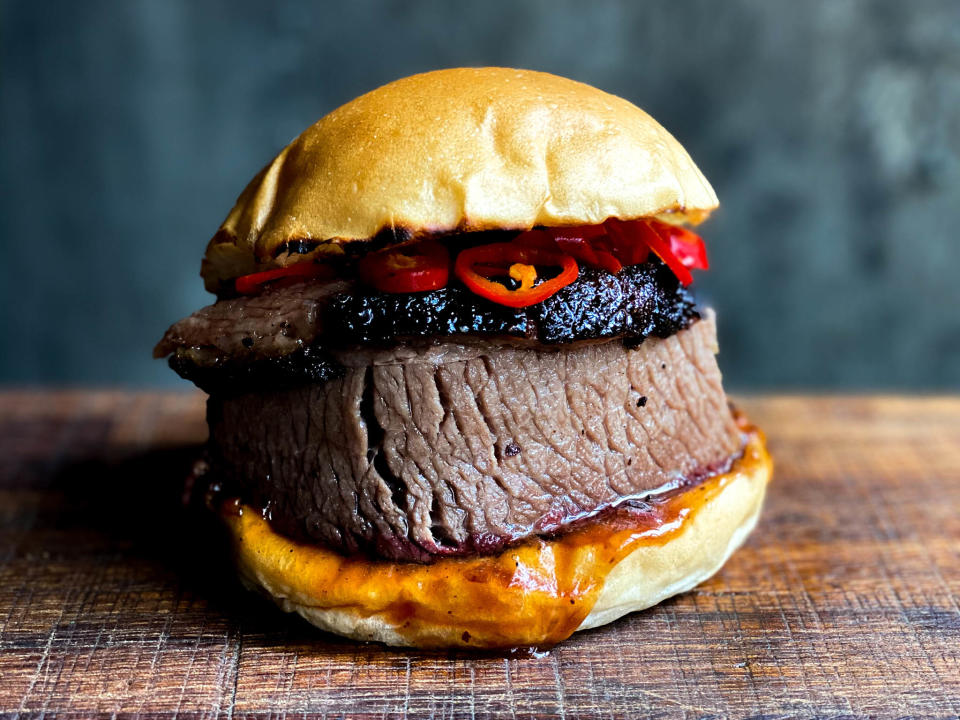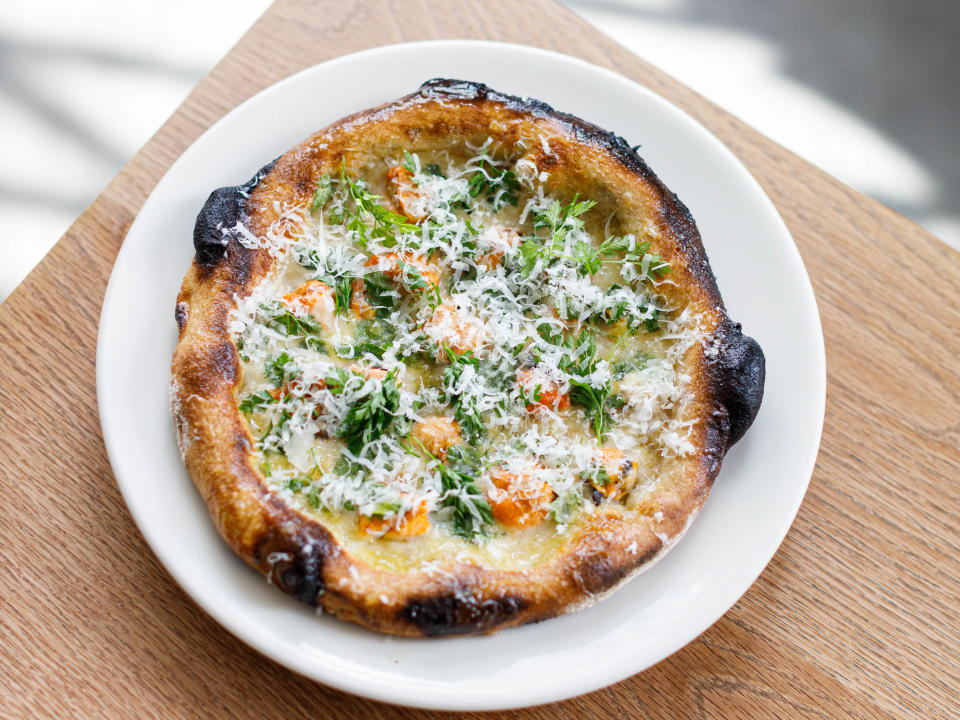‘It will totally undo what we tried to save in August’: How the 10pm curfew threatens the hospitality industry

We are sat at our table in Cornerstone, Hackney, sated but still savouring the last of our cheese course. To our left, two guys are engaged in an animated discussion about Star Wars; to our right a couple are, like us, lingering over a seductive combination of carrot and walnut cake, creamy, oozing brie and honey-sweet Moscatel wine. The time is 10.15pm.
Tom Brown’s acclaimed restaurant is no longer bustling, but still humming with the sound of contented diners enjoying coffees and cocktails, and waiters and chefs slowly winding down for the evening. It is my favourite time to be in a restaurant – and it is the last time I’ll have the opportunity for what Boris Johnson says could be up to six months.
As of Thursday, all restaurants, bars and pubs will have to close their doors at 10pm. There are no exceptions. Whether, like Cornerstone, you are a fine dining restaurant which has spent the past three months imposing socially distanced tables, track and trace systems and rigorous cleaning measures; or whether you are one of the Soho pubs which made the front pages this summer on account of the crowds of drinkers gathered outside, come 9.59pm all customers must be turfed out. There has been no discrimination, says Mark Birchall, who runs Moor Hall, a two Michelin starred restaurant in rural Yorkshire, and a more informal restaurant next door called The Barn at Moor Hall. “Yet the hospitality industry is hugely diverse.”
“You have wet pubs, which don’t serve food, and you have places like ours, which are super covid secure,” he continues. In the past three months he has welcomed more than 7,000 diners, without incident. “We have two sittings at 6pm and 9pm. Guests don’t come into contact with other guests. There is no rapid turnover of tables. Here and at The Barn” – Birchall’s more informal restaurant – “guests say they feel safe and super comfortable. Why haven’t they distinguished between us and the pubs?” For restauranteurs, it feels like unnecessary salt in the wounds which have already been inflicted by lockdown, and which were only just beginning to heal thanks to Eat Out To Help Out.

“It feels pretty catastrophic, especially given what the industry has been through in the past few months,” says James Lowe, who like everyone else has already had to reduce the number of tables in his restaurants, Lyle’s and Flor, due to social distancing measures.
“Now we need to essentially halve the number of bookings we take across the evening as there can be no sitting post 8pm” – which might not sound like too much of a hardship until you look at the cold, hard maths. “On paper, a 10pm curfew hardly seems unreasonable. However, the literal translation to the industry is an 8pm last sitting. On restaurants that survive on two or three sittings this… curtails trade by up to 50 per cent” says David Carter, chef and founder of Smokestak in east London.
At The Boat Inn in Lichfield that translates as “£3,000 on Friday and Saturday evenings,” says owner Liam Dillon: proof that eating late is not just a London phenomena. “People do eat later. They work later, there are more demands on their lives these days. It just feels like the government is completely out of touch with modern dining and modern life.” The shorter sittings don’t just mean fewer diners; it means less spend per head, on coffee, drinks and cheeseboards. It means customers who otherwise come out don’t bother, “because it affects people’s ability to come out and make an evening of it.”
It goes without saying that for most restaurateurs these restrictions would be understandable were they necessary to stop the spread of Covid 19, and funded accordingly. As things stand, however, they are neither.
The latest figures from Public Health England shows transmission of the disease is less than 5 per cent in hospitality sector, while 45 per cent is transmitted care homes. Workplaces and educational establishments follow not far behind. “I’m all for taking changes that are going to make people safer and slow the spread of the virus,” says Carter, “but closing an hour earlier feels empty, especially given that most of the transmission isn’t happening in restaurants and we go out of our way to provide a safe environment with social distancing and cleaning measures.” In fact, says Birchall, reducing the hours in which restaurants can operate just means “more people leaving and arriving together.” “If you’re shutting your doors at 10pm, everyone is leaving at 10pm,” he continues – and in cities, that means multiple restaurants and bars emptying out onto public transport. “It’s goes against everything we have all been trying to do from the start.”

If, in a few weeks’ time, we fail to see the surge in cases predicted then fair play to them, says Xavier Rousset, a long-standing restauranteur who, in addition to Blandford Comptoir in Marylebone, has just opened Black Book, a bar and brasserie with a late night license until 3am in Soho. “If it proves well targeted, I will accept it. But I have my doubts that this will magically prevent the spread of the virus” – and in the meantime, he and his fellow late night license holders face the prospect of laying off scores of employees. “We have been trading well. We were taking a lot of orders between midnight and 3 in the morning, and we had taken on new staff – who can’t go on furlough because they are new hires. If we take in 40 per cent of what we used to take and there is no government support, there will be collateral damage in terms of staff costs.” At the time of writing, no government support is forthcoming.
This isn’t just about the reduced table capacity either, says Carter. “The other less-than-obvious consideration is the fear ‘the broader message’ instils in the hospitality industry. If the wider public lose confidence in the safety of restaurants, bars and pubs through government messaging and propaganda – and indeed do believe the virus is a real threat in these settings – we may then even struggle to fill that 8pm booking slot, or many others for that matter.”
After all the gains made thanks to Eat Out To Help Out, which drew diners across the country with its promise of money off and assurances of safety, Boris Johnson risks undoing all of the hospitality industry’s hard work. “It will totally undo whatever we tried to save in August,” says Rousset – “and not knowing how long it’s going to go on for doesn’t help either.” “They should be encouraging people to be sensible and do the right thing,” says Birchall. “Instead, they are just making them scared.”
“Eat Out to Help Out… gave the whole industry a chance to gain a heartbeat again,” says Chris Leach of Manteca in Soho. “Following the success, we continued with a Monday to Wednesday set menu at Manteca this month which has been well supported.” The optimist in him believes those people who have gone out to restaurants “will continue to do so. But confidence is a very fragile thing that is easily lost but difficult to re-gain.”
Of course, if the past six months have shown anything, it is how resilient restaurants can be – and how adaptable. From home deliveries to take away hatches, Eat Out To Help Out extensions and full menu experiences, restaurant owners and chefs have shown themselves eminently capable of rising to seemingly insurmountable challenges – but there is a palpable sense that, for many, the curfew could prove a bridge too far.
“In these situations the hospitality industry is renowned for being positive and finding solutions,” says Andrew Wildsmith of Forest Side, a Michelin starred restaurant and hotel in the Lake District. Since reopening, they have only had guests of the hotel at dinner time, to reduce capacity and ensure their safety – so they can make up for the loss of the hotel bar by offering guests “in room experiences, like room service night caps. We’re playing with ideas at the moment,” he says.

His fears are not for Forest Side, but for all the businesses who can’t offer things like this. “This hasn’t really affected us, and we’re trying to be positive – but I do feel for other restaurants.” Those restaurants which expanded into retail during lockdown might have an advantage: diners of Top Cuvée in Highbury can pop to Shop Cuvée and take a bottle home after closing time. Those having too good a time to call time at Paladar in London’s Southwark can pick up a bottle of fine tequila from their adjoining cellar to make their own margaritas.
For most, though, this is sore blow – particularly to restaurants in city centres, which thrive on late night licenses and rely on people travelling into town – even less likely now people are working from home again.
“Soho and Shoreditch: these are late night places. That is the culture, and they have been more severely impacted by the pandemic than residential areas because of home working. I don’t think Soho can afford another struggle like this,” Rousset sighs. Lowe will open Lyle’s, his Shoreditch restaurant, earlier – “at 5pm for dinner, in a bid to try and re-gain the bookings we will now lose for later in the evening. But as people will now be back to working from home, that will inevitably be much harder and lunch trade will also be reduced.”
Not being able to have one last drink; not being able to go out to eat if we finish working late; for restaurant and bar-goers this is just a tiny step backwards. For their owners however, it is a huge leap closer to the grim prospect of job losses and shuttered doors.
Read more
Eat Out to Help Out extension: Who are the real winners of the scheme?
The chefs changing the problem with diversity in restaurant kitchens
Tipping point: The restaurants scrapping ‘discretionary’ service charge


